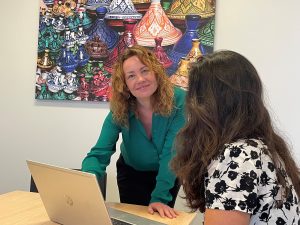Moving on to a better life

Moving On is a program for women who have escaped family and domestic violence and need support finding their path to a better future. It was developed as part of the Western Australian government’s COVID-19 recovery plan, in response to an increase in family and domestic violence.
According to the Australian Institute of Health and Welfare, nearly 5% of women had experienced physical or sexual violence from a current or former co-habiting partner during a 3 month period in 2020.
Family and domestic violence has no boundaries occurring across demographics and socioeconomic circumstances.
Donna Stones, career advocate at Women’s Health & Family Services (WHFS) in Perth, delivers Moving On at several venues, including women’s refuges around the city. The 8-week program runs on Monday mornings during the school term because a lot of the participants are mothers with school age children.
Moving On participants range in age from their 20s to their 40s, and come from diverse cultural, social and economic backgrounds. All have suddenly found themselves without stable housing or money to support themselves and their family.

Moving On recognises that women impacted by family and domestic violence often need help to find work. The program explores topics such as career planning; resume and cover letter preparation; interview strategies; as well as personal development skills including motivation; resilience; and addressing barriers to employment.
Moving On offers training to women who are not eligible for other government programs or support. ‘People on income support may be eligible for preemployment programs and courses, which are designed to provide the workplace skills they need, however, the women in our program have fallen between the cracks,’ Donna says.
Women with large gaps in their work history are in particular need of assistance when it comes to looking for work.
‘Women who didn’t complete high school or have been out of the workforce for the last ten or 15 years are not only out of the loop in terms of the qualifications required but face re-entering an employment market where the jobs they might have done in the past are no longer available,’ Donna says.
As the job market has changed so much, many women are simply unaware of occupations they may actually be well-suited for, Donna says.
Building a support network
Stigma is also an issue. According to Donna, people often find it hard to talk to family and friends about the violence, so meeting others in similar situations can provide the opportunity to build a support network.
‘In the beginning, it’s easy for discussions to be all about sharing and retelling stories because obviously this is a huge part of their lives and foremost in their minds.
‘Domestic violence really is something that only people who have experienced it can fully understand, however I try to steer the conversations away from this topic in class. I encourage them to focus on their futures and their goals.’
Donna describes herself as the group facilitator rather than the teacher. Nonetheless she says Moving On isn’t a counselling group but is focussed on developing skills and helping women find employment.
‘I provide plenty of content for them and it’s important that it’s all relevant because they make so much effort to get here.
‘The crucial part is getting them confident enough to engage with the material and share their thoughts. Then we really start to move forward with ideas and goal setting.
‘We start with a “low risk” activity such as a career quiz, which helps to draw out the participants’ interests and strengths. There’s no pressure to speak up or share anything, so they can just relax, observe the class and settle in.’
But Donna can empathise with feeling out of your depth with a new group. She says that when she joined Moving On last year she was quite apprehensive.
‘Most of my teaching experience was at a college in the UK where I taught young adults aged between 16 and 20 … just out of high school.
‘I worried that the women in Moving On may already know a lot of what I was going to deliver and it might be hard to train adults, many with years of work experience, impressive qualifications and well-developed perspectives.
‘However, what I have found is that these women really value the experience of going back to learning again. Not necessarily learning in the academic sense, but learning as part of a group, some for the first time in many years, where they can think about themselves and their goals and have something in common with their peers.’

Once the women understand they have shared experiences, the peer support develops Donna says.
‘After they realise they are all in this together they feel more comfortable about contributing to the activities and discussions in class.
‘I have to be very flexible as a facilitator. I know that some participants are dealing with temporary accommodation; young children who need ferrying to school; PTSD; mental health issues; legal issues and so on. There’s a lot of things for them to juggle before they even think about getting to class each Monday.’
Donna says one of the most important things in her role as facilitator is to be able to read the room.
In the beginning she took a more conservative approach relying heavily on her prepared content.
But as her confidence grew, she could see the value of peer-to-peer teaching so she adapted the content accordingly.
‘I’ve learned a lot from the participants about overcoming barriers and having resilience,’ Donna says.
‘Sometimes a participant attends but isn’t really there emotionally. I tell them that coming in and just being with the group is better than not coming at all. Turning up is a significant achievement and I always thank them for it.’
Moving On isn’t just about finding a job. It’s also life coaching to help participants cope with challenges and setbacks.
‘Shared experiences can be useful for problem solving. For example, explaining gaps in employment or broaching the topic of a criminal record has been a challenge for some participants who don’t have a lot of self-confidence,’ Donna says.
Just leaving a domestic violence situation is a significant leap but if you can’t find work, it can make this difficult transition unsustainable. This was Sofie’s experience after she escaped domestic violence with her young children. Financial independence was a key part of her recovery.
After completing the Moving On program, Sofie began applying for jobs and soon started being invited to interviews and was offered an administrative job which she could fit around her family.
Donna says it’s still early days and Sofie is still trying to heal from the trauma she has experienced but being back in the workforce is helping her to recover. Some women take longer than others to find their feet but what matters is that they have goals and a plan.
‘Although the focus of the program is on preparing women to re-enter the workforce, it isn’t a numbers game where we are just trying to get the participants into a job, any job.
‘Rushing into employment might be counterproductive. What we really want is for them to have figured out their own way forward.
‘If someone enrols in a qualification or finds work it’s obviously a good outcome, but if someone leaves us with the belief they can have a better future, that’s a far greater outcome,’ says Donna.
whfs.org.au/services/career-services/moving-on
See the full issue of Quest 2, 2022




































































































